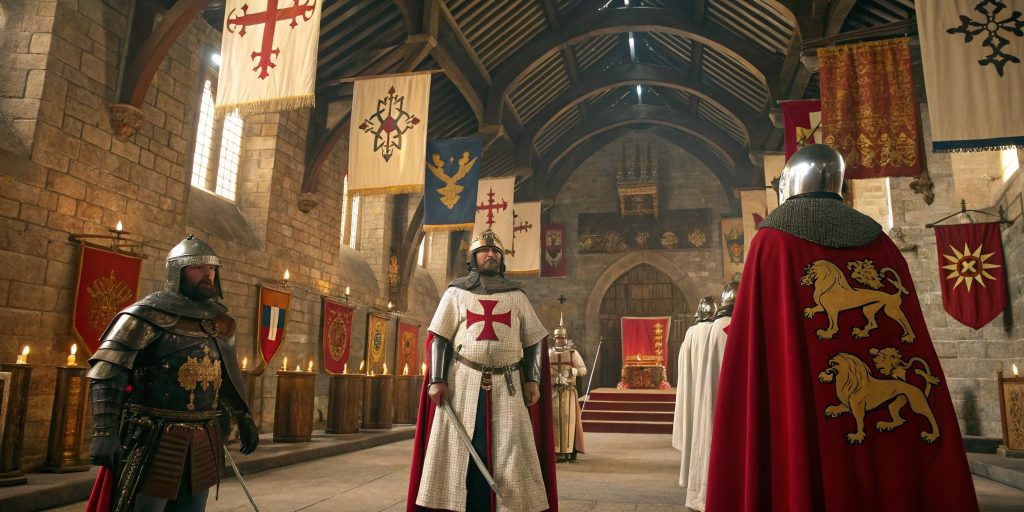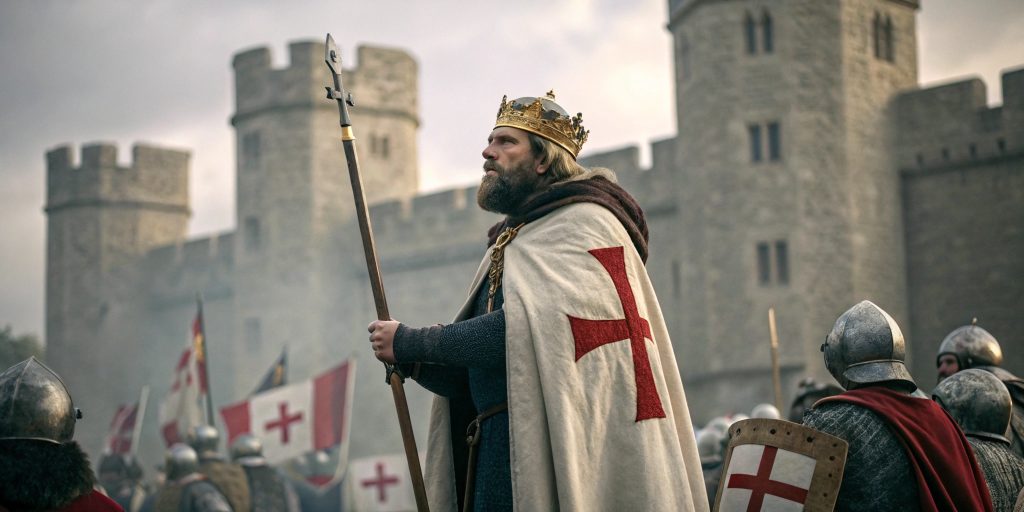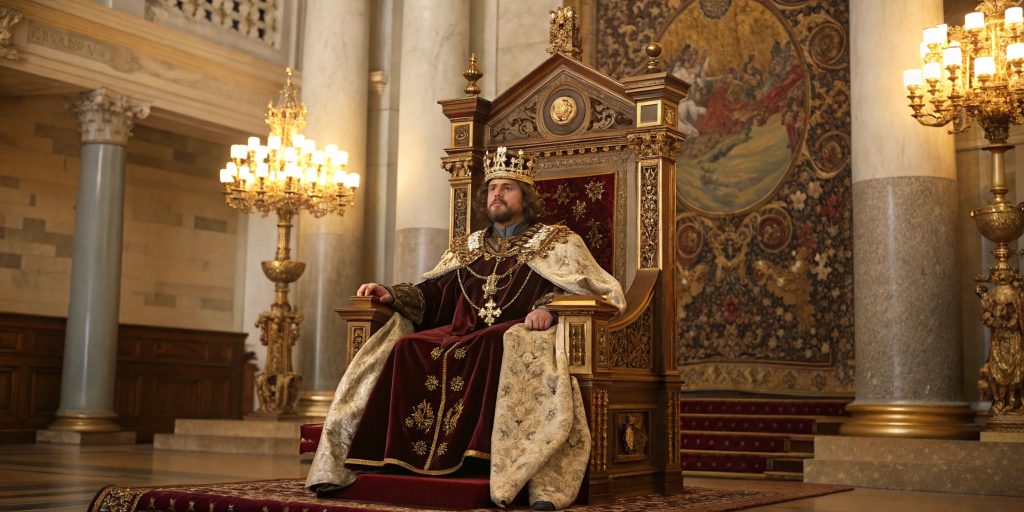The Templar Knights were key in medieval Europe’s politics. They helped kings by providing military and financial support, strengthening their power.
English kings were big beneficiaries of this help. They used the Templars’ power to rule better. This was crucial for their success.
The Templar Knights did more than fight. They also contributed money and were part of local communities, which helped kings maintain their power and control.
This article will examine how the Templar Knights helped kings. They played a big role in medieval politics and helped kings become more powerful.
The Role of Templar Knights in Medieval Politics
The Templar Knights played a big role in medieval politics. They were elite soldiers who protected pilgrims and fought in the Crusades. Their skills made them key allies for kings wanting to grow their power.
Kings often sought the help of the Templars to prove their rule. The Templars’ support strengthened the kings’ claims.
The Templar order started in the early 12th century. It grew into a powerful group with lots of money and resources. This money helped fund wars and build strong places.
With their wealth, the Templars helped kings show their power. This helped keep the kingdom stable.
The Templars and kings worked well together. The kings received strong military help, and the Templars received political power. This partnership was vital in medieval Europe’s politics.
Understanding What Did The King Do In The Middle Ages
The kings of medieval Europe were seen as having a mix of duties, power, and divine right. They were expected to be strong in war, skilled in diplomacy, and fair in justice. This ensured their kingdoms were stable, as they were seen as chosen by God to care for their people.
Key Characteristics of Medieval Europe King
A good king at this time had a few important traits:
- Divine Right: They believed their power came from God, adding a spiritual layer to their rule.
- Military Leadership: Being a brave warrior was key to protecting and growing the kingdom.
- Diplomatic Skills: Making alliances and treaties was crucial for keeping power.
- Just Rule: Being fair and just earned respect and loyalty, making for a stable kingdom.
Significant Monarchs of the Era
Many monarchs showed these traits in their own ways:
- William the Conqueror: His conquest of England in 1066 started a new chapter.
- Richard the Lionheart: His bravery in the Crusades showed the warrior side of kings.
- Henry V: His military wins and fights for rights balanced diplomacy and war.
The relationships these kings had with groups like the Templars were vital. They helped shape their legacies and strengthen their rule in medieval Europe.
King Middle Ages: How Kings Secured Power
In the Middle Ages, kings used many means to gain and maintain power. They made strong alliances through marriages and treaties, which helped them grow their lands and maintain their rule.
Getting support from nobles and the church was key. Kings gave land and titles to loyal nobles, creating a strong network of loyalty that helped the king stay in power.
War was also important for gaining power. Kings fought to beat rivals and take over new lands. The Templar Knights helped immensely, using their strength to support the king.
Creating new laws was another way to strengthen the king’s rule. Laws helped the king govern better and kept peace inside the kingdom. With military power and alliances, kings built a strong base to rule in the Middle Ages.
The Impact of Templar Knights on Royal Legitimacy
The Templar Knights greatly impacted royal power in the Middle Ages. They helped support claimants and kept people loyal, making them key allies for kings.

With their military skills and organization, they helped strengthen the throne. This changed how governments worked during tough times.
Support for Claimants to the Throne
The Templar Knights helped many claimants to the throne by getting people to support their claims, which smoothed power changes.
They were vital in big moments, like when William the Conqueror rose to power. This shows how Templars and royal power were linked.
Templars as Enforcers of Royal Will
The Templars kept the peace and followed the king’s rules. They stopped rebellions and ensured the king’s orders were followed, which helped kings stay in power.
This relationship showed how Templars and kings needed each other. Changes in Templar power affected the stability of many reigns.
The Relationship Between Monarchs and the Templars
The ties between monarchs and Templar Knights were complex in medieval Europe. Kings gave them lands and benefits in exchange for military help and money. This helped the Templars grow powerful and support royal goals.
Monarchs and Templars had different views. Some saw the Templars as strong allies in battles. They helped kings by adding to their power and wealth.
But the Templars’ growing wealth worried some kings. Their lands and money made kings feel less in control, leading to fights and changing the time’s politics and wars.
The bond between monarchs and Templars was full of ups and downs. Their alliances helped sometimes but also caused distrust, which shaped medieval Europe in big ways.
Major Events Influenced by Templar Knights
The Templar Knights played a big role in history. They were involved in the Crusades and key battles. This showed their power in politics and war.
The Crusades and Their Impact on Royal Claims
The Crusades were more than just religious wars. They mixed faith and power. Templar Knights were key, fighting for Christian pilgrims.
Their role made kings look more powerful. Kings wanted to take back holy lands and needed the Templars’ strength to prove they were correct to rule.
Significant Battles Involving Templar Support
Many battles with Templar Knights were crucial. The Battle of Hattin was one. The Templars helped the Crusaders win.
These battles showed the Templars’ bravery and the power of the kings they backed. Their help made kings seem more legitimate.
Case Studies of Templar Support for Specific Kings
The Templar Knights greatly impacted many kings in the Middle Ages. They worked closely with Edward III and William the Conqueror, and their help was vital in times of war and political trouble.
King Edward III and the Templar Influence

King Edward III used the Templars to help him in the Hundred Years’ War. Their skills in battle and money helped him fight off enemies. They also helped him keep his treasury full and gave him important information.
This support made Edward appear stronger and more legitimate as king, helping him keep control over the English throne.
William the Conqueror and the Templar Alliance
The Templars greatly contributed to William the Conqueror’s victory in England. They gave him military strength and made him look good to his people, helping him become the first Norman king of England.
The Templars also helped him deal with the complex politics of the time. Their support made his new kingdom more stable. This alliance was crucial in starting the Norman dynasty in England.
The Decline of the Templar Order and Its Effects on Royalty
The Templar order started to decline in the early 14th century. This was mainly because of Philip IV of France’s political goals. He wanted more power and saw the Templars as dangerous because of their wealth and influence.
This move led to the Templars being disbanded. This change had a big impact on royalty across Europe.
The loss of Templar support changed how royal power worked. Kings who used to count on the Templars for help and money were now at risk. They had to find new ways to stay powerful without a strong ally.
- Without military support, kings were more open to challenges from others.
- New groups emerged to take the Templars’ place, changing court politics.
- Royalty had to deal with more complex alliances as the political scene changed fast.
This big change in support networks had a broad impact on royalty. It changed the balance of power in Europe, and monarchs had to find new ways to show their strength, changing the old power structures.
Legacy of Templar Knights in Medieval History
The Templar legacy in medieval history shows their significant impact on Europe. They fought in many battles and helped shape banking and trade. Their work in finance helped start new banking ways, showing their lasting impact.
They built amazing churches and fortresses that show their cultural mark. These buildings show the mix of faith and military power, the Templars’ strong commitment to both.
The Templar spirit lives on in today’s groups and stories. Many groups today take inspiration from the Templars. Learning about the Templars helps us see their big role in history and their lasting effect on monarchies. Their story still sparks interest among scholars.
Final Words
The Templar Knights and the Middle Ages kings had a complex but important relationship. The Templars were more than just soldiers. They helped kings prove their power and keep their rule strong.
This partnership changed how kings ruled during a precarious time. It showed a big shift in how they handled their duties.
The Templars were key to helping kings maintain their power. They protected the kingdom and ensured the king’s wishes were followed, especially during the Crusades.
Their actions often decided whether a king could keep their land, showing how closely their fates were tied. Their relationship was based on mutual help and need.
The Templars’ support of kings left a lasting impact on history. Understanding this is important to understanding how medieval Europe changed. It shows the complex alliances that shaped the era.

